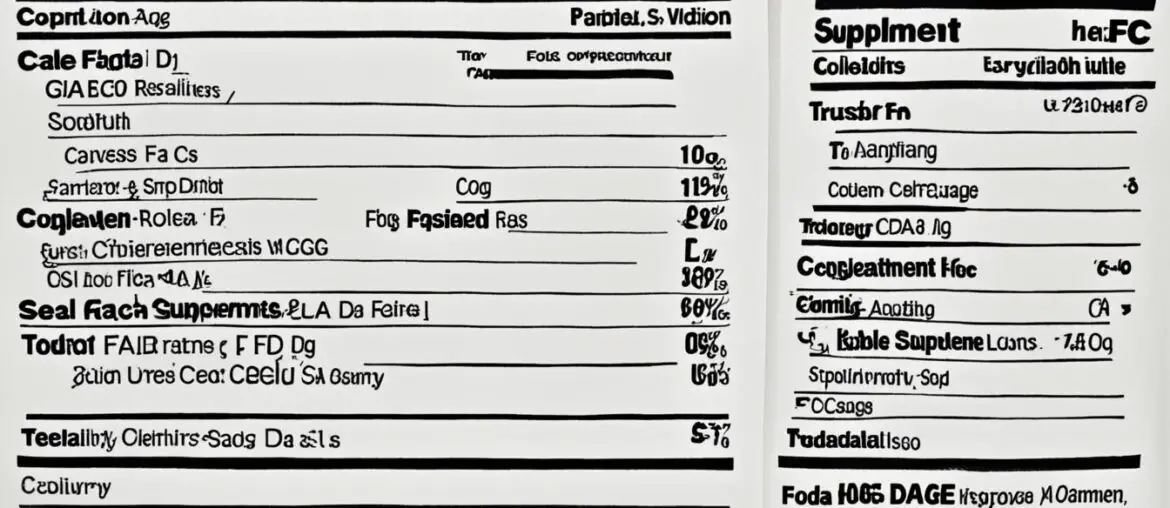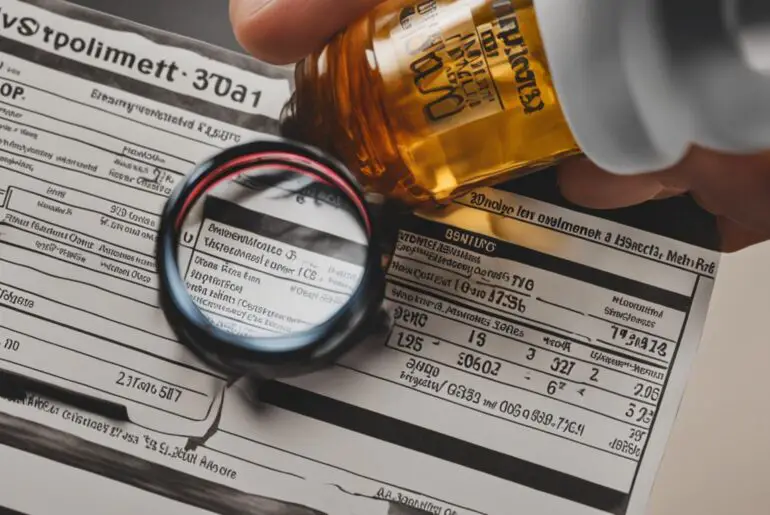Did you know that the FDA advises consumers to avoid HCG weight-loss products that claim to contain HCG and are marketed in the form of oral drops, pellets, and sprays? These products, often accompanied by a severely restrictive diet, have gained popularity in recent years for their promised quick and dramatic weight loss results.
HCG, which stands for human chorionic gonadotropin, is a hormone produced by the placenta during pregnancy. While the FDA has approved HCG for the treatment of female infertility and other medical conditions, it is not approved for weight loss. The use of HCG products for weight loss can result in dangerous side effects and is not a safe or effective method for achieving long-term weight loss.
Key Takeaways:
- The FDA advises against the use of HCG weight-loss products for achieving weight loss results.
- HCG is a hormone produced during pregnancy and is not approved by the FDA for weight loss.
- The use of HCG products for weight loss can lead to dangerous side effects.
- Long-term weight loss should be pursued through safe and evidence-based methods under the guidance of healthcare professionals.
- Consult a licensed healthcare professional for a safe and healthy weight loss plan.
The Dangers of HCG Weight-Loss Products
HCG weight-loss products are often marketed in conjunction with a very low-calorie diet (VLCD), typically limiting calorie intake to 500 per day. This level of severe calorie restriction is not only unhealthy but also dangerous. It can lead to various side effects, including gallstone formation, electrolyte imbalances, and irregular heartbeat. These risks are magnified when a VLCD is undertaken without proper medical supervision.
The use of HCG for weight loss has not been proven to be effective, and any weight loss experienced is likely due to the severe calorie restriction rather than the HCG itself.
Side Effects of Severe Calorie Restriction
Severe calorie restriction, such as that associated with the HCG diet, can have significant adverse effects on the body due to inadequate nutrient intake. Here are some potential side effects:
- Gallstone formation
- Electrolyte imbalance
- Irregular heartbeat
These side effects occur due to the imbalance created by the extremely low-calorie intake, which deprives the body of essential nutrients needed for optimal functioning.
Severe calorie restriction can have serious consequences for your health. It is important to prioritize safe and balanced weight loss methods that focus on long-term health and well-being.
To illustrate the risks, let’s take a closer look at the potential side effects of severe calorie restriction:
| Potential Side Effects | Description |
|---|---|
| Gallstone formation | Significantly low-calorie intake can lead to the accumulation of bile salts in the gallbladder, increasing the risk of gallstone formation. |
| Electrolyte imbalance | Severe calorie restriction can disrupt the balance of electrolytes in the body, leading to issues such as weakness, fatigue, dizziness, and muscle cramps. |
| Irregular heartbeat | The heart relies on a steady supply of nutrients to function properly. When the body is deprived of essential nutrients due to severe calorie restriction, it can result in irregular heartbeat or arrhythmias. |
It is important to note that these potential side effects are not exclusive to HCG weight-loss products but rather a consequence of the severe calorie restriction associated with such diets.
Focus on Safe and Balanced Weight Loss Methods
Instead of relying on HCG weight-loss products and severe calorie restriction, it is advisable to pursue safe and balanced weight loss methods. These methods typically involve gradual and sustainable weight loss through a combination of a balanced diet and regular exercise.
Remember, healthy weight loss is a journey, not a quick fix. Prioritize your long-term health and well-being by adopting sustainable and evidence-based approaches to weight management.
Consulting with a licensed healthcare professional can help you develop an individualized weight loss plan that takes your specific needs and goals into account. They can provide guidance and support throughout your weight loss journey while ensuring your safety and well-being.
| HCG Weight-Loss Products | Severe Calorie Restriction |
|---|---|
|
|
The FDA’s Stance on HCG for Weight Loss
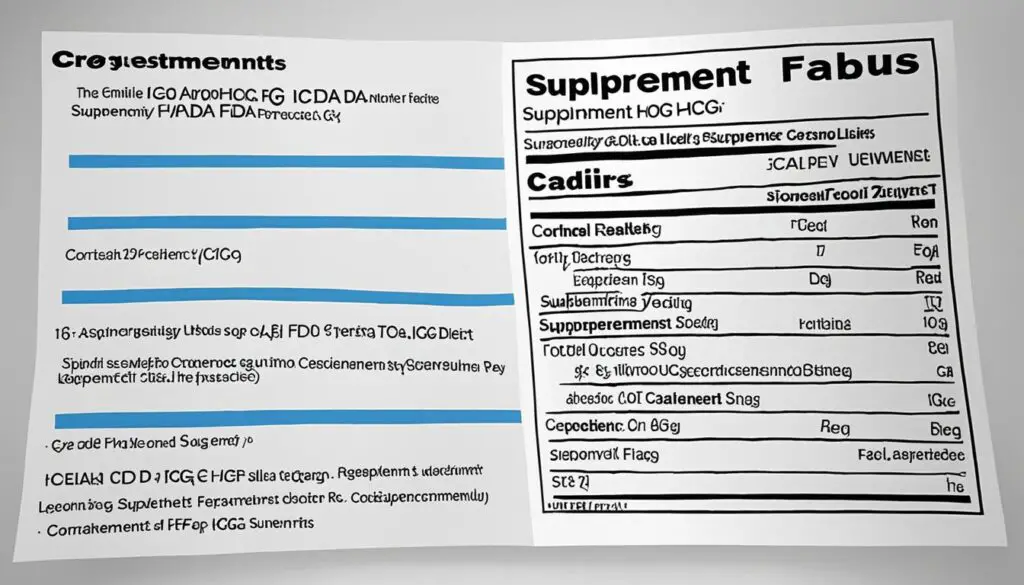
Despite its approval for certain medical uses, the FDA has not approved HCG for weight loss. While HCG, or human chorionic gonadotropin, is commonly marketed as a weight-loss supplement, there is no substantial evidence to support its effectiveness in increasing weight loss or improving fat distribution.
The FDA warns against the use of HCG weight-loss products and states that any weight loss experienced while using these products is likely due to the severe calorie restriction rather than the HCG itself. The restrictive diet that accompanies HCG products typically limits calorie intake to a mere 500 per day, which is considered highly unhealthy and dangerous.
HCG is a prescription drug and should only be used under the guidance and supervision of a licensed medical professional. It is approved for treating female infertility and other specific medical conditions, but not for weight loss. The use of HCG for weight loss poses safety concerns and can result in serious side effects.
“The FDA has not approved HCG for weight loss. There is no substantial evidence to support its effectiveness in increasing weight loss or improving fat distribution. Any weight loss experienced while using HCG products is likely due to the severe calorie restriction rather than the HCG itself.”
| FDA’s Stance on HCG for Weight Loss | |
|---|---|
| Approved for weight loss? | No |
| Medical uses |
|
| Effectiveness in weight loss |
|
| Safety concerns |
|
| Availability | Prescription drug |
The FDA’s stance on HCG for weight loss is clear: it is not a safe or approved method for achieving long-term weight loss. Consumers should be cautious of misleading claims and consult with their healthcare professionals for safe and effective weight loss alternatives.
FDA Actions Against HCG Diet Products
The FDA and the Federal Trade Commission (FTC) have taken significant steps to address the issue of unapproved HCG diet products making unsubstantiated weight loss claims. These products, often labeled as homeopathic HCG, are being sold over-the-counter in various forms, including oral drops, pellets, and sprays.
The FDA and FTC view these products as unapproved new drugs and misbranded drugs, as they have not undergone the necessary evaluations for safety and effectiveness. In response to this, warning letters have been issued to several companies involved in the marketing and distribution of these products.
By issuing these warning letters, the FDA and FTC are emphasizing their commitment to protecting consumers, particularly against misleading weight loss claims. These actions are in accordance with the Federal Food, Drug, and Cosmetic Act and the Federal Trade Commission Act, as the unapproved HCG diet products violate regulatory guidelines.
It is essential for consumers to be aware of these warning letters and the potential risks associated with using unapproved HCG diet products. By understanding the FDA’s stance and the collaborative efforts with the FTC, individuals can make informed decisions about their weight loss journey and prioritize their health and well-being.
In their efforts to protect consumers, the FDA and FTC are vigilant in addressing unapproved HCG diet products and the misleading claims surrounding them. These actions underscore the commitment to ensure that weight loss products on the market meet the necessary safety and efficacy standards set by regulatory authorities.
In the next section, we will discuss the risks associated with very low-calorie diets, providing a comprehensive understanding of the potential harm caused by severe calorie restriction.
Risks of Very Low-Calorie Diets

Very low-calorie diets (VLCDs) pose significant health risks, especially when combined with HCG weight-loss products. These diets often recommend consuming only 500 calories per day, which is not only unhealthy but also dangerous for the body. Restricting calorie intake to such an extreme level can lead to various health complications and risks.
One of the potential risks of VLCDs is gallstone formation. When the body is deprived of an adequate amount of calories, the liver releases more cholesterol into the bile, increasing the likelihood of gallstone formation.
Another concern with VLCDs is electrolyte imbalance. Severely restricting calorie intake can disrupt the balance of electrolytes in the body, including potassium, sodium, and calcium. Electrolyte imbalance can lead to fatigue, muscle weakness, irregular heartbeats, and even more serious health issues.
Additionally, VLCDs can result in protein deficiency. Protein is essential for many bodily functions, including tissue repair, muscle building, and hormone production. Inadequate protein intake can lead to muscle loss, weakened immune function, and slowed metabolism.
Given the potential health risks associated with extreme calorie restriction, it is crucial to undertake a VLCD under proper medical supervision. Gradual weight loss through a balanced and sustainable approach is recommended to minimize the risk of life-threatening complications.
Remember, achieving long-term weight loss should prioritize your overall health, and it is always advisable to consult a healthcare professional before embarking on any significant dietary changes or weight loss plans.
Lack of FDA Approval and Safety Concerns
HCG weight-loss products have not been evaluated or approved by the FDA for safety or effectiveness. The FDA emphasizes that there is no substantial evidence to support the use of HCG for weight loss or its alleged benefits, such as increased metabolism or improved fat distribution. The labeling of HCG products does not provide scientific evidence to support these claims. It is essential to prioritize evidence-based weight loss methods that have been thoroughly evaluated and approved by regulatory authorities.
In recent years, many individuals have turned to HCG weight-loss products in an attempt to shed pounds quickly. However, the lack of FDA approval and safety concerns surrounding these products should give potential users pause. While the FDA has approved the use of HCG for certain medical conditions, the agency has not granted approval for HCG for weight loss purposes. This means that the safety and effectiveness of HCG weight-loss products remain unverified.
The FDA’s evaluation of HCG products has concluded that there is insufficient evidence to support weight loss claims associated with HCG. The agency warns consumers against falling for misleading marketing tactics that promote HCG as a miracle weight loss supplement. It is crucial to remember that weight loss is a complex process that requires a comprehensive approach involving a balanced diet, regular exercise, and lifestyle modifications.
Using HCG weight-loss products without FDA approval is not only potentially ineffective but also risky. The FDA has raised concerns about the potential side effects and safety of these products. It’s always best to consult with a healthcare professional before starting any weight loss regimen.
While proponents of HCG weight-loss products may argue that they have experienced successful weight loss, it is essential to consider the role of severe calorie restriction in these cases. HCG weight-loss products typically accompany severely restrictive diets, often limiting calorie intake to just 500 calories per day. It is this drastic caloric restriction that leads to weight loss, rather than any inherent benefits of HCG itself.
The FDA’s evaluation of HCG products has not only highlighted the lack of evidence supporting their effectiveness but has also raised safety concerns. Using HCG for weight loss can result in a range of side effects, including electrolyte imbalances, gallstone formation, irregular heartbeat, and mood swings. Such risks outweigh any potential benefits claimed by HCG weight-loss products.
Myth: HCG Boosts Metabolism for Weight Loss
One of the most common claims made about HCG weight-loss products is that they boost metabolism, allowing individuals to burn more calories and lose weight quickly. However, the FDA has found no scientific evidence to support this claim. In fact, studies have shown that HCG has no significant impact on weight loss or metabolic rates.
It is important to approach weight loss with caution and skepticism, especially when it comes to unproven and potentially dangerous methods like HCG weight-loss products. Instead of relying on quick fixes or unapproved supplements, it is recommended to focus on long-term lifestyle changes that promote overall health and sustainable weight loss.
When it comes to your health, it is essential to make informed decisions based on reliable evidence and expert guidance. Always consult with a healthcare professional before starting any weight loss program or using weight-loss supplements. Prioritizing safety and evidence-based practices is crucial for achieving long-term, sustainable weight loss.
Reporting Adverse Events and Side Effects

Both healthcare professionals and consumers play a crucial role in ensuring the safety of HCG weight-loss products. Reporting any adverse events or side effects to the FDA’s MedWatch Safety Information and Adverse Event Reporting Program is essential. This allows the FDA to monitor and track potential risks associated with HCG products, further safeguarding the well-being of consumers.
Reporting adverse events and side effects can be done conveniently through the FDA’s website or by using the downloadable reporting form. By taking the time to report, you contribute to the ongoing evaluation of HCG weight-loss products and help identify any potential safety concerns.
When reporting adverse events or side effects, be sure to provide detailed information, including the product name, manufacturer, and a description of the event or effects experienced. The more information provided, the better the FDA can assess the potential risks and take appropriate actions to protect public health.
Why Reporting is Important
Reporting adverse events and side effects related to HCG weight-loss products is vital for several reasons:
- Identification of Safety Issues: By reporting, you help identify potential safety concerns associated with HCG products. This includes identifying new or previously unknown adverse events that may require further investigation.
- Risk Evaluation: Reporting allows the FDA to evaluate the frequency and severity of adverse events and side effects, providing a clearer understanding of the risks associated with HCG weight-loss products.
- Product Monitoring: Reporting helps the FDA monitor the safety of specific HCG products on the market, as well as track patterns and trends to identify potential risks.
- Public Safety: Reporting adverse events and side effects assists in protecting public health by ensuring that potentially harmful HCG products are identified and appropriate actions are taken to mitigate risks.
“No one is invincible to the potential risks associated with HCG weight-loss products. Reporting adverse events and side effects is a collective effort in promoting a safe and informed marketplace for all.”
Together, we can make a difference by providing valuable information to the FDA and contributing to public safety. Your participation in reporting adverse events and side effects is essential in shaping the future regulations and oversight of HCG weight-loss products.
| Benefits of Reporting | How to Report |
|---|---|
| 1. Identifies safety concerns | 1. Report online through the FDA’s website |
| 2. Evaluates risks | 2. Download the reporting form and mail it to the FDA |
| 3. Monitors product safety | 3. Contact the FDA’s MedWatch Program by phone |
| 4. Protects public health | 4. Provide detailed information about the product and adverse events |
FDA and FTC Actions Against Homeopathic HCG Products
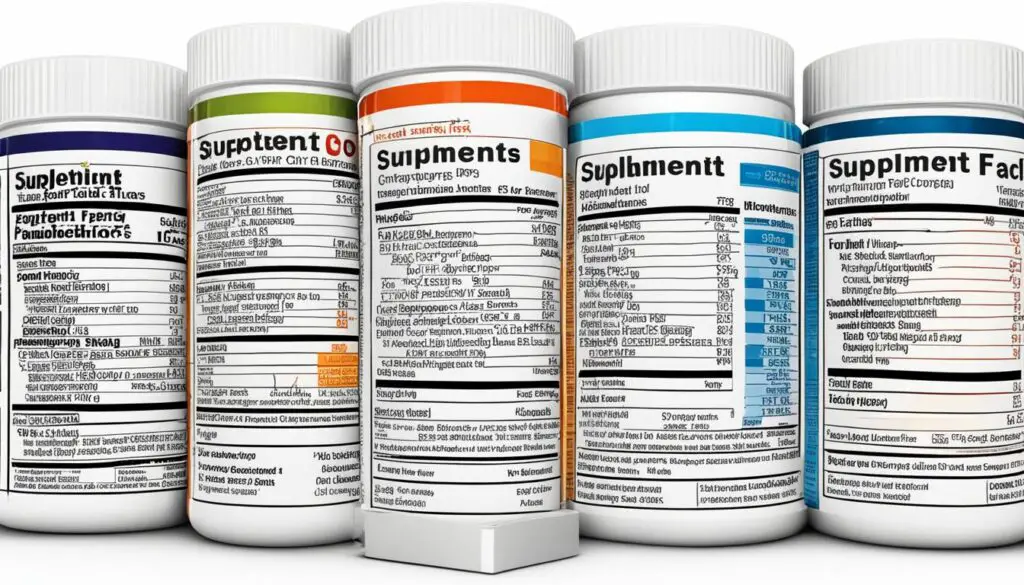
The FDA and FTC have joined forces to take action against manufacturers and distributors of homeopathic HCG products that are marketed for weight loss. These products, labeled as homeopathic, are available over-the-counter in various forms. The companies responsible for these products have received warning letters for violating the Federal Food, Drug, and Cosmetic Act and the Federal Trade Commission Act.
The key violations include selling unapproved new drugs and making misleading weight loss claims. The FDA and FTC consider these products to be unapproved and misbranded drugs. The companies have failed to provide evidence to support their weight loss claims, and their products have not been evaluated for safety or effectiveness by the FDA.
If these violations are not addressed, the FDA and FTC can take further enforcement actions, impose penalties, or pursue legal prosecution against the manufacturers and distributors of these homeopathic HCG products.
Warning Letters to Homeopathic HCG Product Manufacturers/Distributors
The FDA and FTC have issued warning letters to several companies involved in the manufacturing and distribution of homeopathic HCG products for weight loss. These warning letters serve as a strong message that the marketing and sale of unapproved new drugs with misleading weight loss claims are not tolerated.
“The sale of unapproved new drugs with deceptive claims is a significant concern, especially when it involves products that are marketed for weight loss,” said Dr. Janet Woodcock, Director of the FDA’s Center for Drug Evaluation and Research.
Unapproved New Drugs with Misleading Weight Loss Claims
The FDA and FTC have identified numerous homeopathic HCG products that make unsubstantiated weight loss claims. These claims are not supported by scientific evidence and mislead consumers into believing that the products will aid in weight loss.
Homeopathic HCG products marketed for weight loss are considered unapproved new drugs because they have not undergone the necessary evaluation for safety and effectiveness. The companies responsible for manufacturing and distributing these products have not obtained FDA approval, making them illegal and potentially dangerous.
Collaboration between FDA and FTC
The FDA and FTC have collaborated to address the issue of homeopathic HCG products marketed for weight loss. By combining their efforts, these regulatory agencies can work together to protect the public from deceptive marketing practices and ensure the safety of consumers.
“Collaboration between the FDA and FTC is essential to preventing the sale of unapproved and potentially dangerous drugs,” stated Andrew Smith, Director of the FTC’s Bureau of Consumer Protection.
Protecting Consumers from Unsafe Weight Loss Methods
The FDA and FTC’s actions against manufacturers and distributors of homeopathic HCG products demonstrate their commitment to protecting consumers from unsafe weight loss methods. These actions aim to prevent potential harm caused by unapproved drugs and misleading claims.
Consumers should be cautious when considering weight loss products and consult with healthcare professionals to determine safe and effective options. It is vital to prioritize evidence-based approaches to weight loss and avoid products that make false claims or have not received FDA approval.
Prescription HCG and its Limited Use
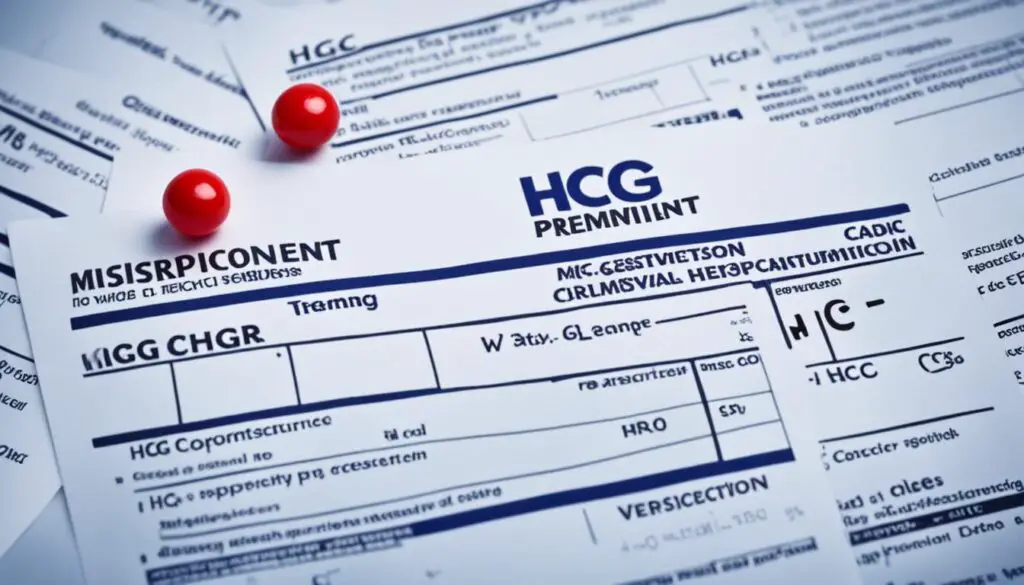
Prescription HCG products have limited approved uses, such as treating female infertility and certain hormonal conditions in men. However, they have not been approved by the FDA for weight loss or obesity treatment. There is no scientific evidence supporting the use of prescription HCG for weight loss, and off-label use may lead to unexpected adverse events. Reports of serious adverse events, including pulmonary embolism, depression, cerebrovascular issues, cardiac arrest, and death, have been associated with the use of HCG injections for weight loss.
Remember: The FDA has not approved prescription HCG for weight loss. Its limited approved uses are specific to treating infertility and certain hormonal conditions. Off-label use of HCG for weight loss poses significant risks and has been associated with serious adverse events.
Discontinuing the Use of HCG Weight-Loss Products
If you are currently using HCG weight-loss products, it is essential to discontinue their use and discard any remaining product. Continuing with these products may pose risks to your health and overall well-being. To ensure a safe and effective approach to weight loss, it is crucial to consult with a licensed healthcare professional. They can guide you in developing a personalized weight loss plan that prioritizes your health and long-term success.
The first step in discontinuing the use of HCG weight-loss products is to stop following any labeled dieting instructions. These instructions may be based on the false premise that HCG can aid in weight loss, which is not supported by scientific evidence. Instead, focus on adopting a balanced diet and incorporating regular exercise into your lifestyle. Gradual weight loss, achieved through sustainable methods, is more likely to result in long-term success.
While discontinuing HCG weight-loss products, it is important to explore safe alternatives for weight loss. Consulting a healthcare professional will allow you to receive personalized guidance and recommendations based on your specific needs and goals. They may suggest strategies such as portion control, mindful eating, and the inclusion of nutrient-dense foods to promote healthy weight loss.
Remember, the key to achieving lasting weight loss is to prioritize your overall health and well-being. By discontinuing the use of HCG weight-loss products and consulting a healthcare professional, you are taking a proactive step towards a safe and effective weight loss journey.
Conclusion
The use of HCG weight-loss products as diet aids has become a cause for concern due to several reasons. Firstly, these products lack FDA approval, which means their safety and effectiveness are not substantiated. Moreover, many HCG products make misleading claims about their ability to promote weight loss, creating a false sense of hope for consumers.
The FDA warns against the use of HCG products for weight loss due to the potential health risks involved. These risks primarily stem from the severe calorie restriction typically associated with HCG diets. Consuming only 500 calories per day is not only unhealthy but can also lead to gallstone formation, electrolyte imbalances, and irregular heartbeats.
To ensure their long-term health and well-being, consumers are advised to pursue safe and evidence-based weight loss methods under the guidance of healthcare professionals. Gradual weight loss achieved through a balanced diet and regular exercise is the recommended approach. By prioritizing their health, individuals can avoid the dangers associated with unsafe weight loss methods and achieve sustainable results.
FAQ
Are HCG weight-loss products approved by the FDA?
No, HCG weight-loss products have not been approved by the FDA for safety or effectiveness.
What are the potential risks of using HCG weight-loss products?
Using HCG weight-loss products can lead to severe side effects, including gallstone formation, electrolyte imbalances, and irregular heartbeat.
Can HCG weight-loss products help with long-term weight loss?
No, there is no substantial evidence to support the use of HCG weight-loss products for long-term weight loss, and any weight loss experienced is likely due to severe calorie restriction.
How does the FDA regulate HCG weight-loss products?
The FDA advises against the use of HCG weight-loss products and takes action against companies making unapproved weight loss claims.
What are the health risks of very low-calorie diets?
Very low-calorie diets, often recommended alongside HCG weight-loss products, can lead to gallstone formation, electrolyte imbalances, and protein deficiency.
Is HCG approved by the FDA for weight loss?
No, HCG is not approved by the FDA for weight loss.
Consumers can report adverse events or side effects to the FDA’s MedWatch Safety Information and Adverse Event Reporting Program.
What actions have the FDA and FTC taken against homeopathic HCG products?
The FDA and FTC have issued warning letters to manufacturers and distributors of homeopathic HCG products for making unapproved weight loss claims.
Is prescription HCG approved by the FDA for weight loss?
No, prescription HCG has not been approved by the FDA for weight loss and may lead to unexpected adverse events.
What should individuals do if they are currently using HCG weight-loss products?
Individuals should discontinue the use of HCG weight-loss products and consult with a healthcare professional for a safe weight loss plan.

